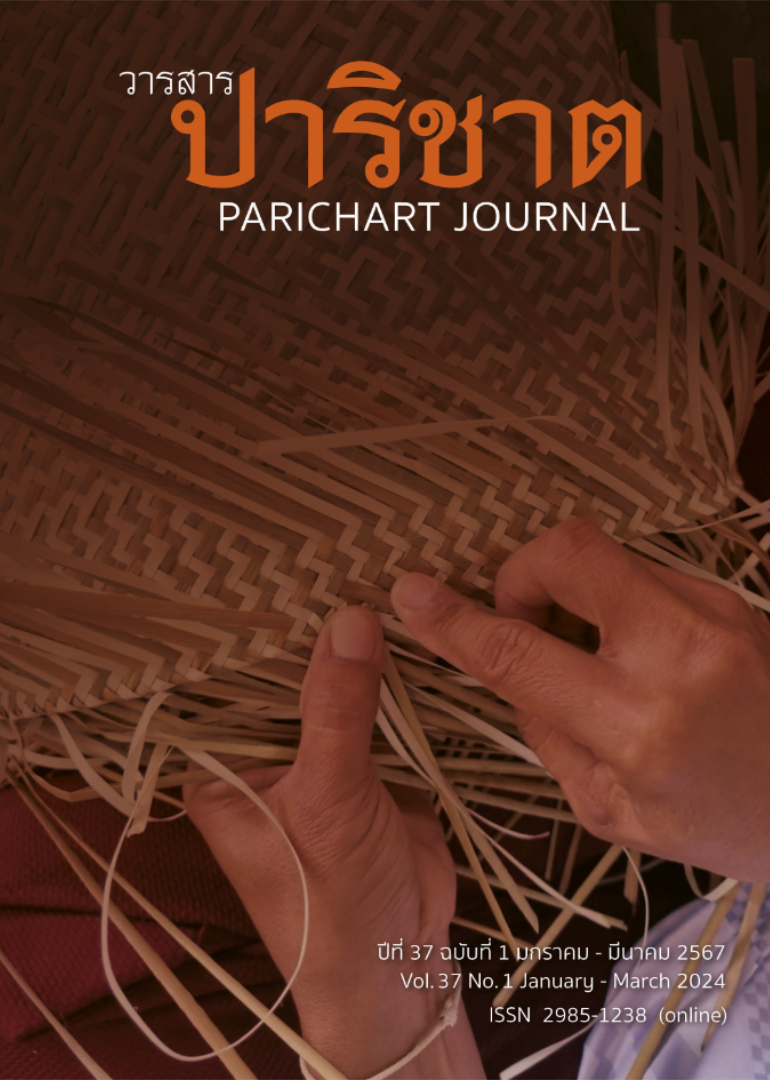The Origin of Thai Surname: Establishment of Patriarchal Power within Thai Family
Main Article Content
Abstract
This article has studied surname enforcement according to the Surname Act, B.E. 2456, in the early days of enforcing surnames, through analyzing historical evidence and related documents, based on the patriarchal outlooks of Luce Irigaray, a French feminist philosopher to explain how that forcing of the surname inherited from fathers to sons or male relatives becomes the origin of patriarchy in the family system. However, the Surname Act was also the starting point for creating what Irigaray called a "Male Subject" in a patriarchal society. But for the attempt to establish a male identity in the Thai state, it has rather helped strengthen the ideology of the traditional state to be embedded in the modern state to be inherited by inheriting the surname.
Article Details

This work is licensed under a Creative Commons Attribution-NonCommercial-NoDerivatives 4.0 International License.
References
Irigaray, L. (1985). Speculum of the other woman. Cornwell University Press.
Whitford, M. (1991). Luce Irigaray: Philosophy in the feminine. Routledge
Smith, A. M. (2015). Subjectivity and subjectivation. In L. Disch & M. Hawkesworth (Eds.), The Oxford handbook of feminist theory. (pp. 955-972). Oxford University Press.
Stark, H. (2017). Feminist theory after Deleuze. Bloomsbury Academic.
Rosi Braidotti, R. (2017). Sexual difference theory. In A. M. Jaggar & I. M. Young (Eds.), A companion to feminist philosophy. (pp. 298-306). Wiley.
Carol, C. (2019). Luce Irigaray on women and natural law. In J. Crowe (Ed.), Research handbook on natural law theory. (pp. 236-251). Edward Elgar.
Irigaray, L. (1991). The irigaray reader. Basil Blackwell.
Irigaray, L. (1993). Sexes and genealogies. Columbia University Press.
Meuchubot, W. (2001). The various matters of surname. Palace Lovers Club. (In Thai)
Mangkut, T. (2018). Irigaray’s reading. Thammasat University Archives Bulletin, 21(1), 90-95. (In Thai)
Sarup, M. (1993). Post-structuralism and postmodernism. Harvester Wheatsheaf.
Vajiravudh, King. (1972). Compared surnames with Chinese clan names. In S. Laawkulsaeng (Ed.) Misellaneous Essay: The Royal Writing in King Vajiravudh. (pp.75-90). Slipabhannakan. (In Thai)
Shigetomi, S. (2012). The concept of family and its meaning in Thai history. In Y. Hayami, J. Koizumi, C. Songsamphan, & R. Tosakul (Eds.), The family in flux in Southeast Asia: Institution, ideology. (pp. 29-36). Kyoto University Press.
Wongyannawa, T. (2018). Policing the imagined family and children in Thailand: From family name to emotional love. In P. Phasuthanchat (Ed.), Imagined family: A Critique of community, government and state. (pp. 33-79). Illumination. (In Thai)
Sattayanurak, A. (1995). Changing in worldviews of Thai leaders from the reign of King Rama IV to 1932. Chulalongkorn University Press. (In Thai)
Suklarpkit, S. (2018). One husband and one wife: Family colonialism in Siam. Matichon. (In Thai)
Loos, T. (2002). Subject Siam: Family, law, and colonial modernity in Thailand. Silkworm Books.
Winichakul, T. (2003). What kind of condition is called civilization? When Siamese elites during the reign of King Rama V sought their own status through travels and museums both inside and outside the country. Political Science Journal, 24(2), 1-66. (In Thai)
Anderson, B. (2009). Imagined communities: Reflection on the origin and spread of nationalism. The foundation for the promotion of social science and humanities textbooks project. (In Thai)
Wongyannawa, T. (2019). Introduction: When blindness touches the “Nation” of the West. In P. Phasuthanchat (Ed.), When is a nation? (pp. 17-77). Illumination. (In Thai)
Skinner, W. G. (1986). Chinese society in Thailand: An analytical history. Social sciences and humanities textbook project foundation. (In Thai)
Royal Speech and Royal Advice of His Majesty King Vajiravudh. (1958). In a memorial at the royal cremation ceremony of M.C. Sukprarop Kamalasana (12 January, pp.30-35) Bangkok: Prachan Printing. (In Thai)
Karim, W. J. (2004). Bilateralism and gender in Southeast Asia. In S. Taweesit (Ed.), Gender: Challenging the body, searching for identity. (pp. 79-123). Center for Women’s Studies, Faculty of Social Sciences, Chiang Mai University.
Barnard, A. (2022). History and theory in anthropology. Cambridge University Press.
Duplatre, L. (1990). Status of married women in Thailand. Thammasat University Press. (In Thai)
Eawsriwong, N. (2005). The difficulty of being. Arts and Culture. (In Thai)
NRT. R.6 M.47.2/318 Nai Prayoon, the son of Phra Pipatbhumipaak (Som Bunnag) used to use the surname of his uncle, Saranukorn, and requested to change his surname to Bunnag. (In Thai)
Damrong Rajanubhab, Prince (1998). The letters between two princes Vol.8. Teachers Council. (In Thai)
NRT. R.6 N.47/2 Chao Phraya Phasakornwong had sent a letter to the surname registration official: The story of the Bunnag family family and the heirs who will righted to use this surname. (In Thai)
Bunnag, P. (2020). Love body, fight for right. Matichon. (In Thai)
NRT. R.6 M. 47.2/212 Deputy Apostle Khun Sarananubribarn asked to withdraw the royal bestow surname because his son, Second Lieutenant Thonglor, was given the royal bestow surname, Sukasut. (In Thai)


